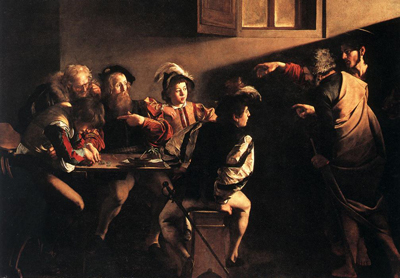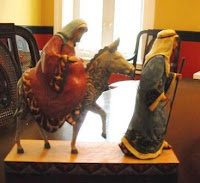Having seen Hans Urs Von Balthasar's, 'The Heart of the World', likened with Thomas a'Kempis, I wonder.
The literary critique came be seen in the Preface of Ronald Knox, specifically in his Preface of the Imitation.
"A work without frills-until
you reach the fourth book, which is purely a manual for the
Communicant, it contains curiously little in the way of theology. The very
existence of the Holy Spirit is only recognized, for example, in one or two
stray allusions. You can feel the influence of a reaction against the
over-subtle speculations of the later medieval theologians; those masters who
are more concerned to know than to live well (Bk. I, ch. 3), whose arguments
will be silenced when Jerusalem is searched with lamps (Bk Ill, ch. 43)." Ronald Knox
The Imitation of Christ by Thomas a’Kempis,
trns. Ronald Knox .
PREFACE
How many books are
there whose titles you can clip till they only contain one effective word, and
yet be understood by all educated people? The Apologia is one, there is
Butler's Analogy, and Paley's Evidences, but you will not find
many names to match them: nobody talks of the Anatomy of Melancholy as
the Anatomy, or of the Origin of Species as the Origin. Such
tests are tiny reflectors that give back the glow of fame; and no book passes
this test so well as the Imitation. Among Catholics at least it is the
only book which is mentioned in the same breath with the Bible; among the
non-Catholics of yesterday the Pilgrim's Progress ("the
Pilgrim" for short) was so bracketed. Yet, like other spiritual classics,
the Cloud of Unknowing, for example, or the Whole Duty of Man, it
has created problems of authorship. And the reader has a right to expect, here,
a dissertation upon the Dutchman, Groote, who is said to have written the first
book as it stands, and the degree of recension to which Thomas a Kempis
submitted the second and third: with more information about the circumstances
in which the work was composed, and the form of it. But this must be omitted,
since I am writing away from books-not, however, away from the Imitation; it
has only once, I think, escaped the packer's eye since I received the sub
diaconate. "Do not ask," says Bk. I, eh. 5, "who said this, but
listen to what is said". There are no frills about the Imitation.
[Footnote}This was Mgr. Knox's contribution to "The
Catholic Classics" series in The
Tablet and was first published in the issue of April 20th 1940. It was written many years before he started
to translate the Imitation and
the quotations from the Imitation which
appear in it are rendered differently in the present work.
6 Preface
My
aim is to seize upon the characteristic method and effect of the book, and I am
not sure that this aim has not been already realized when I have said that there
are no frills about the Imitation. It has the frill-lessness of
Euclid and the Athanasian Creed. Where the first book is concerned, you may say
that even to the style. "Sometimes we think that others are fond of our
company when in fact it is beginning to disgust them, from the worthlessness of
the character they see in us" (Bk. I, eh. 8): how could you administer in
less words a cold douche to a man who has spent the evening with friends?
"If you cannot make yourself the man you want to be, how can you expect
other people to come up to your specifications?" (Bk. I, eh. 16): "if
you bother so little about yourself while you are alive, who is going to bother
about you when you are dead?" (Bk. I, eh. 23)-these are barbs which get
beneath the skin of the toughest among us; and yet how quietly they are shot.
It
has been commonly observed that the first book is concerned almost entirely with
the reformation of character, and a good deal of it might have been drawn from
heathen moralists-in one place, indeed, Seneca is quoted. But if it . was the
author's intention to confine himself to the elements of asceticism, he has certainly
outrun his intention; as in the eleventh chapter, where he writes: "If we
were thoroughly dead to ourselves, and free from attachments within, we should
be able to relish divine things and have some experience of heavenly contemplation".
He is already impatient for the illuminative way, and by the first chapter of
Book II he is well into it. Detachment, the conversion of the regard inwards,
the welcoming of mortifications with and for Christ, are ideals taken for
granted. The Imitation, wide as is its use outside the cloister, and
indeed outside the Church, was
7 Preface
meant for religious
in the first instance, and the author makes no apology for thus suddenly keying
us up to concert pitch. The rest of Book II is, and is meant to be,
"stripping"; we are not to be content with moral suasions, or treat
our own peace of mind as the ideal to be aimed at; we are concerned with
nothing less than the establishment of Christ's reign in us. If we are ready to
give up having our own way, that is no longer because "it is necessary
sometimes to relinquish our own opinion, for the sake of peace" (Bk. I,
eh. 9), but because "you are not to think you have made any progress until
you feel that you are everybody's inferior" (Bk. II, eh. 2). If we avoid
gossip, it is no longer because "we rarely return to silence, without
finding that we have soiled our consciences" (Bk. I, eh. 10), but because
"you will never know interior devotion, until you hold your tongue about
what concerns others, and turn back upon yourself" (Bk. II, ch. 5). And
learning is to be distrusted as inadequate, not because "he is truly
learned, who leaves his own will and does the will of God" (Bk. I, ch. 3),
but because "one thing is still wanting ... that a man should leave all,
and leave himself, and go out of himself altogether, and keep nothing for
himself of self-love" (Bk. II, eh. 11). We have embarked on an inner
circle of spiritual ideas, and no rest is given us. The clerical
"we", which softened the effects of Book I, almost disappears in Book
II; the author button-holes you with a persistent "thou", and brings
every consideration grimly home to you.
So
Book II leads us up to that amazingly uncomfortable last chapter, in which the
reader feels as if he were being turned over and over on a spit, to make sure
that he is being singed with suffering at every point. If a man tells you that
he is fond of the Imitation, view him with sudden suspicion; he is
either a dabbler or a
8 Preface
saint. No manual is
more pitiless in its exposition of the Christian ideal, less careful to
administer consolation by the way. But now, when we feel we have been bullied
into the illuminative way, is the stripping part all over? Is the third book to
be a collection of maxims illustrating the unitive way, and its glimpses of
fruition ? Dr. Bigg, in his introduction, writes as if it were: it tells, he says,
"of the presence of Christ in the soul, of life in the spirit, of the mystic
vision, as cl Kempis understood it". This judgement seems to be founded on
one or two passages in the third book, rather than on the book as a whole. The twenty-first
chapter, that begins with a beating of the wings as the soul aspires towards
God, and culminates in the sudden "Ecce adsum" of the Divine
Lover's intervention, leaves asceticism behind and breathes pure mysticism; but
it stands almost alone. The dialogue from of the book—it consists entirely of
conversations between Christ and the soul—suggests that it is the r 'fruit of a’Kempis'
own contemplations; and perhaps the absence of scheme about it can be explained
best if we suppose that he simply wrote these down as they came to him in the order
of time. But the subjects treated are, for the most part, still in the ascetic sphere;
or at best they are consolations addressed to the soul in the dark night which
comes before the way of union. It is not in any sense a mystical treatise; [1] the
fifty-sixth chapter is still urging us towards the way of the Cross. The writer
is still coaxing us onwards; he does not try to take our breath away.
A
work without frills-until you reach the fourth book, which is purely a manual
for the Communicant, it contains curiously little in the way of theology. The
[Footnote]
It is perhaps only fair to state that Mgr.
Knox's view of the Imitation as
"not in any sense a mystical treatise" is not shared by all writers on
the mysticallife.-M. O.
9 Preface
very existence of
the Holy Spirit is only recognized, for example, in one or two stray allusions.
You can feel the influence of a reaction against the over-subtle speculations
of the later medieval theologians; those masters who are more concerned to know
than to live well (Bk. I, ch. 3), whose arguments will be silenced when
Jerusalem is searched with lamps (Bk Ill, ch. 43). A book without frills—was
there ever a spiritual author who told us less of his private experiences? It
was he, presumably, who felt anxiety about his final perseverance, and was told
to act as he would act if he were certain of it (Bk. I, eh. 25); that is the
only echo of autobiography. The whole work was meant to be, surely, what it is—sustained
irritant which will preserve us, if it is read faithfully, from sinking back
into relaxation: from self-conceit, self-pity, self-love. It offers consolation
here and there, but always at the price of fresh exertion, of keeping your head
pointing up-stream. Heaven help us if we find easy reading in The Imitation
of Christ.
R. A. KNOX














.jpg)